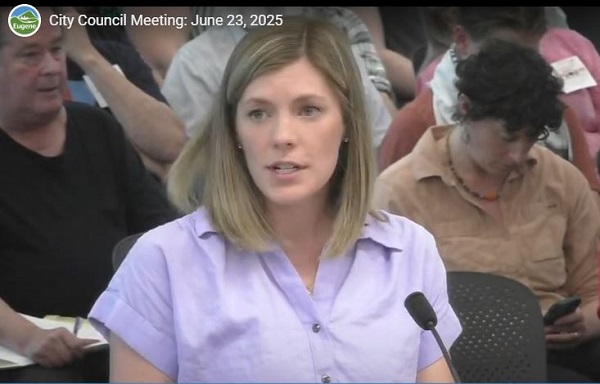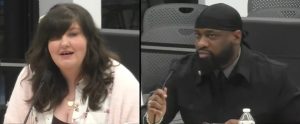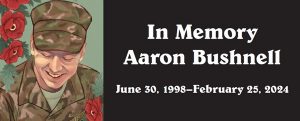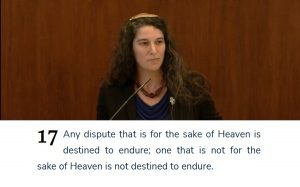Business leaders offer help with city budget
11 min read
Presenter: After a very public disagreement with local business leaders over a $10 million ‘forever fee,’ Eugene’s City Council passed a budget with a smaller fee and agreed to hold public meetings on long-term budget stabilization.
During public comments June 23, business leaders asked to be included in those discussions. Allison Straub:
Allison Straub: My name is Allison Straub. I’m the president and CEO of Burley, a local family business founded in 1978. I’m a lifelong citizen of the Eugene community, and my spouse and I are raising two, soon-to-be three children here.
[00:00:35] I’m deeply invested in Eugene’s future. Thank you for the time and energy that you’ve brought to what has been a difficult budget cycle and process. While complex and imperfect, a compromise outcome was achieved, leaving me very optimistic. Now we must move with urgency into the critical work of long-term budget stabilization so that we don’t see ourselves in this difficult position a few years from now.
[00:00:58] As a local business owner, I want to underscore that we’re not outsiders. We’re a part of Eugene’s fabric. We’re raising families, paying taxes, hiring locally, volunteering, and supporting community causes. At the same time, we’re working to maintain and grow businesses that create jobs, strengthen the local economy, bringing in outside dollars, and investing in sustainability.
[00:01:18] In this next phase of work, I ask that you please intentionally include business voices on the proposed budget stabilization task force. We’re not asking for a seat out of criticism, but because we care deeply about Eugene and want to help build a sustainable future. Business leaders can bring tangible experience. We’re in it for the long haul, and we have deep community ties.
[00:01:41] The budget stabilization community should include individuals with proven budgeting and operations expertise and a track record in successful budget stabilization—just as its name implies.
[00:01:52] Looking ahead, we need long-term fiscal strategy that goes beyond cuts and short-term fees. That means evaluating new services for efficiencies while also supporting economic development to grow jobs and bring in new revenue and investing in housing to expand our population and tax base.
[00:02:08] Thank you again for your work and for your time. I’m here tonight instead of reading my kids their bedtime stories because I want to reinforce the genuine commitment of the business community to contribute constructively. We’re asking for the opportunity to proactively participate—to bring our skills, perspectives, and commitment to the table to shape a stronger future for our collective home. Thank you.
[00:02:30] Greg Erwin: My name is Greg Erwin. I am the CEO of Sapient Private Wealth Management and an investor in Onward (Eugene)’s Elevate 2028. Thank you for this opportunity to address you this evening.
[00:02:42] First, I’d like to commend all of you for the exceptional work you’ve done this year to develop a new biennial budget. I recognize many compromises have been made in this in this process. And when compromises are made, no one is fully satisfied with the outcome. That’s the nature of compromise.
[00:03:03] That said, I believe the exercise stimulated newfound engagement from many atypical pockets of the community. I see this as a very positive development, more voices from more constituencies, not all in alignment as to priorities or methodologies, but in the end, workable solutions.
[00:03:28] We can build on this experience.
[00:03:32] My life, I have found that the best solutions often come as a result of very hard work, uncomfortable work, sometimes even contentious work. I’ve also found that hard problems are typically more readily solved by many brains versus a few brains.
[00:03:55] I believe all of us in this room truly want our community to offer sustainable physical, emotional, and financial well-being for everyone. Let’s start with what we agree on. Let’s get committed, smart people together to formulate new ideas directed toward our common goals. This too will require compromises from nearly everyone. But just imagine how much good we can do together.
[00:04:23] As my hope, we can immediately begin these discussions. I hope we can embrace the financial challenges we face with a fresh sense of enthusiasm and welcome new faces and voices to the conversations. Community has been energized by the budget process this year. We should capitalize on that energy and get to the hard work as soon as possible.
[00:04:46] Both the public and the private sectors have essential roles in pursuing lofty community goals, both bring experience, influence, and resources required to create the leverage necessary to succeed.
[00:04:57] Erik Parrish: My name is Erik Parrish. As a 43-year resident of Eugene, having lived or worked in every ward, I’m deeply invested in our community. Thank you for the opportunity to speak today.
[00:05:09] I want to begin by expressing my sincere appreciation for the council’s diligent work during this challenging budget cycle. Balancing revenue needs with the preservation of vital services is never an easy task. And while compromises were inevitable, your efforts to navigate these difficult decisions are truly commendable.
[00:05:26] Now it’s time to move forward collaboratively. Let’s focus on solutions and the urgent need to begin long-term budget stabilization work immediately. Thorough analysis and meaningful public engagement will take time, and the sooner we start, the better prepared Eugene will be for the future challenges.
[00:05:40] As you consider forming a stabilization committee, I strongly urge you to include business leaders. This isn’t a critique of past decisions, but rather a recognition of the invaluable contributions we can offer. Business leaders bring practical expertise in budgeting, operations, and long-term planning, along with invested interest in Eugene’s success and deep community connections. Our diverse perspectives can help craft balanced and sustainable solutions for our city.
[00:06:05] I personally would welcome the chance to support this work however I can. Rebuilding community trust is critical. Transparency and inclusive planning will foster confidence in the path ahead.
[00:06:15] Beyond just cuts and fees we must also consider strategic housing investments to grow our population and property tax base and targeted economic development to expand businesses, jobs, and revenue opportunities.
The business community stands ready to contribute constructively. We bring ideas, energy, and a shared commitment to a stable, vibrant Eugene. Let’s work together to ensure our city thrives, not just this year, but for generations to come. Thank you for your time and leadership.
[00:06:41] David Van Der Haegen: I’m David Van Der Haegen. I oversee community and government affairs for NW Natural here in Eugene. And I also sit on the Eugene Area Chamber of Commerce’s Local Government Affairs Council.
[00:06:52] Over the last year I’ve paid close attention to the numerous work sessions, budget committee meetings, and public comment periods regarding the city’s upcoming biennial budget. Like most matters that come before you, you’ve engaged in a substantial process with the community leading up to this moment.
[00:07:09] But despite that process and engagement, strong and sharp reactions have abounded. Trust and respect, the very principles that a city executive once stressed to me as essential to repairing relationships, are now strained. Our community’s resources are applied, limited and finite, and despite your best intentions, questions regarding transparency and ethics have been raised.
[00:07:33] Going back isn’t an option. So to move forward, it’s my hope that Council, staff, and the community who have weighed in so heavily this time around can double down on a holistic approach to subsequent budget processes that emphasizes economic development, a long-term commitment to engaging personnel with practical, real-world experience in operations and finance, as well as those who understand the nuances in the relationship between housing, job opportunities, child care, transportation, education, social services, health care, and the arts, to name a few.
[00:08:09] The goal should be a critical and unfiltered analysis that validates what we all want: a long-term commitment to our community’s success. As someone who’s worked in the public and private sector and here in Eugene, someone who uses our parks and pools with his children, and someone who remains hopeful that for everyone here, the best is yet to come, I urge you to see the forest through the trees and build a shared vision that looks at your constituents as your neighbors, employers, and partners who want to return on investment in terms of sustainable revenue, strong services, as well as businesses and the people who run them being at the table to improve our shared quality of life, a life that I believe is worth living. Thanks very much.
[00:08:53] Leah McCool: Hi, everyone, and thank you for having me. My name is Leah, and I’m a local business owner here in Eugene. My husband is attending law school here at the University. I’m also here on behalf of the Eugene Chamber’s Young Professionals Council.
[00:09:06] We are involved in this organization because we’re passionate about building a truly vibrant and welcoming business community here in Eugene. I also want to say thank you for the work that went into increasing the stormwater fee, which I recognize helped avoid painful budget cuts to, for example, the library.
[00:09:22] I watched carefully and I realized that this year’s debate was not an easy one. That being said, I do hope that a continued increase of the stormwater fee is not a long-term solution.
[00:09:32] For longer-term solutions, for impacts that will last 10 to 20 years down the line, as an entrepreneur and as a young business professional, I am among those that want to help. We have our own lived experiences, fresh ideas, and have a personal stake in wanting Eugene to work better for everyone, including young people.
[00:09:50] We also believe that Eugene’s supply of appropriate housing is directly tied to a long-term solution.
[00:09:56] Like many other students at the law school, my husband and I have taken out loans to help fund his education. We truly could have not made it through his first year of law school without them. From my perspective, I believe the average cost of rent among young people is not reflective of a working individual’s earned income, but rather is reflective of student loan income or financial assistance from parents.
[00:10:17] In addition to the popular saying that Eugene is the greatest exporter of talent, not only are young people’s rent being financed by parents or debt, but then the students move elsewhere to start their career. In my eyes, a fantastic opportunity to grow our tax base and therefore city revenue is by incentivizing more young people to live and work here in two ways: through more attractive, appropriate housing and through a safe, vibrant and thriving business community.
[00:10:44] As a business community, I believe our ideas have a place in shaping these long-term strategic investments and we are more than eager to be involved. Therefore, we ask you to please include the business community in these discussions. Thank you all so much.
[00:10:59] Chris Edwards: My name is Chris Edwards. I’m here to encourage you to adopt the compromise budget that’s before you. You know, stormwater fees, some targeted cuts, but as soon as you do, assuming that you do, I encourage you to get started right away on moving through a transparent and inclusive process that includes the business community to develop long-term sustainable solutions.
[00:11:27] I think not only have successful business owners and entrepreneurs and managers been through a lot just to maintain their businesses and so they have a lot of perspective, management perspective to bring to these budget conversations, but they also have a wealth of networks. And those networks sometimes don’t just inform the decisions that are being made, but helps create support for whatever it is that comes out of that process.
[00:11:54] In 2013, I was chairing the Natural Resources Budget Committee in the Oregon Legislature, and members of the business community came to me and said, ‘You know, we’re not really excited about the DEQ budget. We think there’s a lot of waste. We don’t think they need as much money as they’re asking for in the budget.’
[00:12:14] I said, ‘Well, let’s get everybody together.’ So over the course of three meetings, these regulated members of the business community sat down and got a real deep dive into the DEQ budget. And they came out the other end in full support, and actually came to me afterwards and said, ‘We’re actually concerned that they don’t have enough resources to get expedited or to judiciously move through the permitting process.’
[00:12:42] So it can really work to the benefit of the city to involve the business community.
[00:12:49] And finally, I hope that whatever comes as a long-term solution isn’t just a package of cuts and fees, but it’s real consideration of what you’re doing with the money: What programs and policies of the city of Eugene encourage business growth and investment and what policies and actions discourage it and act as a drag on widespread prosperity.
[00:13:17] Sherry Schaefers: I’m Sherry Schaefers. I’m here to echo the thanks for your hard work around the recent budget process and also encourage continued community partnership with all stakeholders.
[00:13:26] Two words come to mind when I think about your difficult job to lead and make decisions. Synergy, which essentially means the whole is greater than the sum of its parts and esprit de corps, which is defined as a feeling of pride and loyalty shared by the members of a particular group, often resulting in a strong sense of unity and mutual support.
[00:13:48] I believe these concepts are particularly relevant as we move forward with our community’s long-term budget stabilization efforts. The challenges we face, whether in economic recovery, public safety, or infrastructure improvements, can be addressed when we work together, business owners, city officials, and residents alike. By fostering a spirit of collaboration and mutual respect, we create an environment where each stakeholder feels valued and empowered to contribute to our shared goals.
[00:14:18] As a small business owner, I understand the importance of community support. Local businesses are not just economic engines, they’re also the heart of our neighborhoods, providing jobs, services, and a vibrant culture. When we work in synergy with the city and other stakeholders, we enhance our ability to innovate, adapt, and thrive in an ever-changing landscape.
[00:14:38] I encourage you all to continue engaging with local businesses and community members as you make decisions that affect us all. Your willingness to listen and involve us in the process not only strengthens our community, but also builds trust and goodwill. Together, we can create a stronger, more resilient Eugene that benefits everyone. Thank you for your time and your commitment to our community.
[00:15:01] Presenter: The City Council is encouraged to draw on the experience of local business leaders in setting priorities and crafting budgets. The Council voted to convene long-term budget stabilization meetings, starting this fall.




